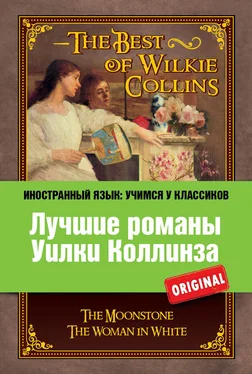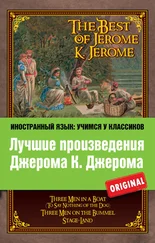But I did say more. I forced back the contemptible tears that were no relief to ME, and that only distressed HER, and reasoned and pleaded as calmly as I could. It was of no avail. She made me twice repeat the promise to live with her when she was married, and then suddenly asked a question which turned my sorrow and my sympathy for her into a new direction.
“While we were at Polesdean,” she said, “you had a letter, Marian – ”
Her altered tone – the abrupt manner in which she looked away from me and hid her face on my shoulder – the hesitation which silenced her before she had completed her question, all told me, but too plainly, to whom the half-expressed inquiry pointed.
“I thought, Laura, that you and I were never to refer to him again,” I said gently.
“You had a letter from him?” she persisted.
“Yes,” I replied, “if you must know it.”
“Do you mean to write to him again?”
I hesitated. I had been afraid to tell her of his absence from England, or of the manner in which my exertions to serve his new hopes and projects had connected me with his departure. What answer could I make? He was gone where no letters could reach him for months, perhaps for years, to come.
“Suppose I do mean to write to him again,” I said at last. “What then, Laura?”
Her cheek grew burning hot against my neck, and her arms trembled and tightened round me.
“Don’t tell him about THE TWENTY-SECOND,” she whispered. “Promise, Marian – pray promise you will not even mention my name to him when you write next.”
I gave the promise. No words can say how sorrowfully I gave it. She instantly took her arm from my waist, walked away to the window, and stood looking out with her back to me. After a moment she spoke once more, but without turning round, without allowing me to catch the smallest glimpse of her face.
“Are you going to my uncle’s room?” she asked. “Will you say that I consent to whatever arrangement he may think best? Never mind leaving me, Marian. I shall be better alone for a little while.”
I went out. If, as soon as I got into the passage, I could have transported Mr. Fairlie and Sir Percival Glyde to the uttermost ends of the earth by lifting one of my fingers, that finger would have been raised without an instant’s hesitation. For once my unhappy temper now stood my friend. I should have broken down altogether and burst into a violent fit of crying, if my tears had not been all burnt up in the heat of my anger. As it was, I dashed into Mr. Fairlie’s room – called to him as harshly as possible, “Laura consents to the twenty-second” – and dashed out again without waiting for a word of answer. I banged the door after me, and I hope I shattered Mr. Fairlie’s nervous system for the rest of the day.
28th. – This morning I read poor Hartright’s farewell letter over again, a doubt having crossed my mind since yesterday, whether I am acting wisely in concealing the fact of his departure from Laura.
On reflection, I still think I am right. The allusions in his letter to the preparations made for the expedition to Central America, all show that the leaders of it know it to be dangerous. If the discovery of this makes me uneasy, what would it make HER? It is bad enough to feel that his departure has deprived us of the friend of all others to whose devotion we could trust in the hour of need, if ever that hour comes and finds us helpless; but it is far worse to know that he has gone from us to face the perils of a bad climate, a wild country, and a disturbed population. Surely it would be a cruel candour to tell Laura this, without a pressing and a positive necessity for it?
I almost doubt whether I ought not to go a step farther, and burn the letter at once, for fear of its one day falling into wrong hands. It not only refers to Laura in terms which ought to remain a secret for ever between the writer and me, but it reiterates his suspicion – so obstinate, so unaccountable, and so alarming – that he has been secretly watched since he left Limmeridge. He declares that he saw the faces of the two strange men who followed him about the streets of London, watching him among the crowd which gathered at Liverpool to see the expedition embark, and he positively asserts that he heard the name of Anne Catherick pronounced behind him as he got into the boat. His own words are, “These events have a meaning, these events must lead to a result. The mystery of Anne Catherick is NOT cleared up yet. She may never cross my path again, but if ever she crosses yours, make better use of the opportunity, Miss Halcombe, than I made of it. I speak on strong conviction – I entreat you to remember what I say.” These are his own expressions. There is no danger of my forgetting them – my memory is only too ready to dwell on any words of Hartright’s that refer to Anne Catherick. But there is danger in my keeping the letter. The merest accident might place it at the mercy of strangers. I may fall ill – I may die. Better to burn it at once, and have one anxiety the less.
It is burnt. The ashes of his farewell letter – the last he may ever write to me – lie in a few black fragments on the hearth. Is this the sad end to all that sad story? Oh, not the end – surely, surely not the end already!
29th. – The preparations for the marriage have begun. The dressmaker has come to receive her orders. Laura is perfectly impassive, perfectly careless about the question of all others in which a woman’s personal interests are most closely bound up. She has left it all to the dressmaker and to me. If poor Hartright had been the baronet, and the husband of her father’s choice, how differently she would have behaved! How anxious and capricious she would have been, and what a hard task the best of dressmakers would have found it to please her!
30th. – We hear every day from Sir Percival. The last news is that the alterations in his house will occupy from four to six months before they can be properly completed. If painters, paperhangers, and upholsterers could make happiness as well as splendour, I should be interested about their proceedings in Laura’s future home. As it is, the only part of Sir Percival’s last letter which does not leave me as it found me, perfectly indifferent to all his plans and projects, is the part which refers to the wedding tour. He proposes, as Laura is delicate, and as the winter threatens to be unusually severe, to take her to Rome, and to remain in Italy until the early part of next summer. If this plan should not be approved, he is equally ready, although he has no establishment of his own in town, to spend the season in London, in the most suitable furnished house that can be obtained for the purpose.
Putting myself and my own feelings entirely out of the question (which it is my duty to do, and which I have done), I, for one, have no doubt of the propriety of adopting the first of these proposals. In either case a separation between Laura and me is inevitable. It will be a longer separation, in the event of their going abroad, than it would be in the event of their remaining in London – but we must set against this disadvantage the benefit to Laura, on the other side, of passing the winter in a mild climate, and more than that, the immense assistance in raising her spirits, and reconciling her to her new existence, which the mere wonder and excitement of travelling for the first time in her life in the most interesting country in the world, must surely afford. She is not of a disposition to find resources in the conventional gaieties and excitements of London. They would only make the first oppression of this lamentable marriage fall the heavier on her. I dread the beginning of her new life more than words can tell, but I see some hope for her if she travels – none if she remains at home.
Читать дальше
Конец ознакомительного отрывка
Купить книгу












